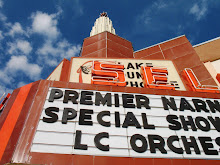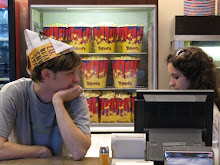 Actress Jurnee Smollett plays Samantha Booke in "The Great Debaters." The character is the only woman on an 1935 all-black debate team from Wiley College (Marshall, Texas). Below is a transcript an interview from a couple weekends ago.
Actress Jurnee Smollett plays Samantha Booke in "The Great Debaters." The character is the only woman on an 1935 all-black debate team from Wiley College (Marshall, Texas). Below is a transcript an interview from a couple weekends ago.PHOTO (from left to right): Denzel Washington, Denzel Whitaker and Jurnee Smollett in "The Great Debaters." (Weinstein Co.)
ALEXANDYR KENT: You must be excited to have a project come out on Christmas day.
JURNEE SMOLLETT: Oh, this is going to be the best Christmas ever. Especially a project like this. It's rare that you get a script that is a jewel. It's rare that you get something you can sink you teeth into and every single molecule of your being can be devoted to it.
AK: One thing that really impressed me about the script is the ensemble. Every single character has meat to it. And really, the trio of the three student roles, they are kind of just rare roles for younger actors.
JS: Definitely. How often do you see young actors playing scholars? Or striving to be intellectuals, you know? It's not that often. It's the first time I had ever gone for a role like this. That's why I was so attracted to the script. The script that Bob Eisele wrote was so intelligent. It's rare. And also, it's such a face that we never see. It's this whole period … that's almost been skipped over.
AK: Do you hope in some ways that this is kind of reawakening for people to remember a time that they never have really been aware of?
JS: I hope it's an education. I hope it stimulates further research. This is just the tip of the iceberg. For every Tolson, there was like hundreds of them. So I hope this kind of tips people off to go back and read all of the Thoreaus and the Langston Hugheses and the James Joyces of the world … and all of these great intellectuals. Maybe society could reverse and it could become sexy to be intelligent.
AK: And not nerdy.
JS: Exactly! You know. Yeah.
AK: What did you admire most about your character?
JS: I admired, well, several things. One is that even though she was in a time and a place that would have gladly encouraged her to stay in her place to know her place, she defied that, even though it was a struggle. It's not something that was easy. I was a struggle for her to find her voice. To find her footing a society that told her where she belonged. And yet with all of that going on, she still said, 'No. I can't stop trying. I'm going to try. I'm going to seek out the best help and I'm going to seek out situations that are going to challenge me and are going to force me to grow.'
AK: Are you a natural debater?
JS: Yes I am. (Laughs.) I think I am. I come from a big family. We debate at the dinner table. My brother sleeps with CNN on. And my mom will say to you, 'I don't care if you're four years old.' She'll say, 'Can you believe what that administration is doing?' (Laughs.)
AK: So you were always encourage to have an opinion.
JS: Oh, God, yes. I was always encouraged to have my opinion. I was always included in the conversation. I think it's so important for all of us to ask why. To have questions. To voice our opinions. To have an opinion in general. A lot of times we are like voiceless bystanders. We don't even have an opinion. I was fortunate enough to be raised by a woman who wanted us to have an opinion and wanted you to be opinionated too. You can disagree. You know? There's an art to disagreeing.
AK: But the way people are disagreeing now is quite different. In 'The Great Debaters,' it wasn't about blood-sport. It's about humiliation. In terms of how we see political figures today, in the media, it's not about debate anymore.
JS: It's true. It's about who you hired to do this. It's a different sport now. But the whole political system now, man, if could have more leaders using their words to shut out their opponents instead of like using bombs and planes, we'd but much better off. A lot of children wouldn't have perished already, you know?
AK: As an actress, was vocally taking on this role, trying to become this kind of oracle for truth, or oracle for argument, was it challenging to just step back and learn the art of speaking like that? That's very much a lost art in some ways.
JS: Yeah, it wasn't an easy, over-the-night thing. That's why I feel the amount of preparation I did beforehand helped me out a lot. But again, a lot of it was something that just came from hearing it when I read the script. Like the accent. The delivery. A lot of it I heard. Umm, you can't beat it up too much. We did rehearsals, we did a lot of like tongue-twisters. And complicated phrases. Denzel almost had in rehearsals like we were doing a play. Standing in a huge room, being passionate and physical.
AK: Where did that happen by the way? Was it in Mansfield Studios?
JS: It was in the preproduction office. He had this whole thing. It was like a warehouse. One day we were doing dance class and the next day we were doing rehearsals. And he wanted us to be as free as possible. It was just one of the best rehearsals, because you were just free to do whatever you wanted. Nothing was wrong. There were no wrongs. Nothing was right. Nothing was wrong. You just did what you did. It was beautiful.
AK: With Nate and Little Denzel in a story about debate, did competitiveness enter into the equation? Did you ever try to outdo one another? Not in like a spiteful way, but in pushing each other?
JS: I don't think so because we're all on the same time. Well, I can't speak for them, but for me I was rooting for them to be their best. Yeah, I didn't want the Harvard people … (laughs). What did they say to that question?
AK: Actually, I didn't ask them that question. I would imagine that Big Denzel pushes you pretty hard. Did he push you?
JS: Oh, definitely. You want a director to push you. Sometimes he shows you a moment that even you don't think you are capable of.
AK: Was there a moment when you surprised yourself?
JS: Um, of course there were a few moments. I don't necessarily think that I surprised myself. It was more so that I kind of got lost inside myself. Those are the moments that you want. True honesty. You just forget everything else that is going on around you, you forget the fact that the prop-master is doing this, that hair and makeup are touching you up, and the camera man is doing this, and they are taking measurements from the camera to your head, and they are putting the marks down. Sometimes, you got to go out there and forget all that's going on. There were times when he would just whisper one thing in my ear, and it would just open my world up. Then there were times when he just left me alone, and encouraged me to keep doing what I was doing and encourage me to do keep what I was doing and then I just found more things. A lot of it wasn't planned. He didn't tell me, 'Cry on this moment.' That very close-up thing (during her character's first opportunity to debate in competition) was like … we did that in three takes. He was telling me about how like the inhale, none of that was planned, he was telling me that when I inhaled, the camera came into focus. It wasn't planned. The crying it was just something that he had said. The crying, it wasn't something that he had said. During the Oklahoma debate he said to me, he said, 'If you are asking the question, get an answer.' He teased me the other night. We had this Q&A and he got up and said, 'You guys should have seen some of those other takes. She really went over to those debaters and demanded that answer.' (Laughs.) But you know. You go there, you do these crazy things and you fail big and you succeed big. But there are no rights or wrongs in acting.
AK: Before I ask you about Shreveport, did you hit Nate (Parker) in that scene?
JS: Mm. (Laughs.) I think I'm not going to tell anyone. Samantha hit him. Samantha hit him hard. I had a great stunt coordinator. We just had to get the timing down to where the camera was lined up a certain way, but people love it. We sold it!
AK: The whole audience went, 'Oh my God! Strong woman!'
JS: (Laughs.) Yeah, but you know? That's an important moment. For someone who is struggling to voice her thoughts and voice her opinions, sometimes less is more! Just cutting him down is sometimes important.
AK: Maybe it's that one excuse for violence in the film.
JS: Yeah. (Laughs.)
AK: He deserved it. … How did northwest Louisiana treat you?
JS: Here's the thing. I might be the only one that says this to you. But I might be the only one who enjoyed Shreveport.
AK: Mm hm. You're not.
JS: I'm not? Then they are lying to you. (Laughter.) No, no, no. I'm teasing. Aside from the chiggers and the mosquitoes and the snake wranglers.
AK: Snake wranglers?
JS: Yeah, that who's the judge scene? You can't see him, but he's in the bushes right behind us catching snakes. Yeah. So aside from all that, I loved how many open fields there were. It was almost like northern California in parts. I'm a nature lover. It was so peaceful. You could see the sky, and see open fields forever. And I liked the shooting locations because you can't duplicate the South. People try to go and Toronto, and sometimes it works. But a lot of times for an actor, shooting in the South for the South is really helpful. You're going through the same things that your character was going through. So, I enjoyed it.
AK: Great. I appreciated it. Thank you.
JS: Thank you.










No comments:
Post a Comment